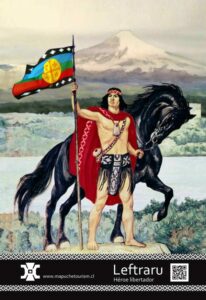Javier Lefiman provided the following information and requested we post it on the ITCA site. We congratulate the Mapuche living culture on their accomplishments:
The Mapuche people are known in history as some of the greatest warriors. They were untamed, and as such, admired by chroniclers and historians. The Mapuche successfully opposed the Incan Empire and later the Spanish Empire. Today, the Mapuche people are more alive than ever. Leftraru, one of the greatest Mapuche leaders, observed and then innovated the military strategies brought by the Spaniards, incorporating them to his own people’s advantage. In the same spirit, the Mapuche Tourism Society is a group of men and women who have found a new way of living and are striving to keep their Mapuche culture alive through the offer of touristic products and services.
Wallmapu is the name of the ancestral territory of the Mapuche. It’s partly located in the Chilean region of Araucanía. In general terms, in this region, three local identities with their cultural differences can be recognized, which are based on the natural landscapes in which they developed—the Mapuche Pewenche, who live in the mountains; the Mapuche Wenteche, who live in the valleys; and the Mapuche Lafkenche, who live by the coast. Every Mapuche seeks to live in harmony with nature, as did their ancestors. They see themselves as part of nature and not as “masters of the universe,” as asserted by some Western religions. For the Mapuche people, humans, nature, and the spiritual world live together in harmony, pursuing what is called Küme Mogen, or Good Life.
Mapuzugun is the ancestral language of the Mapuche. Every word relates to human beings, natural behaviors, and deeper beliefs. It preserves knowledge (Kimün) and thoughts (Rakizuam).
The Mapuche culture, despite several attempts to make it disappear, is more alive than ever, changing and evolving without disregarding its roots and principles that guide their worldview. Today, the Mapuche people innovate by developing products and services with their own cultural elements, which is key to creating added value. Additionally, autonomous economic development is enhanced by the use of new technologies and an increasing number of university graduates in several areas, such as economy, engineering, education, medicine and creative industry.
A living culture is also observed in daily life. The Mapuche people have been able to integrate themselves into cities. They work like any other person but always stay in contact with their original communities. They visit relatives, participate in ceremonial activities such as Gillatun, engage in recreational activities like the game called Palin, design handicrafts, speak their mother tongue (Mapuzugun), and teach their culture to their children, friends, and anyone who values, respects, and wants to promote the Mapuche culture to the world. This way, the entire knowledge is preserved for many new generations.
In summary, Mapuche people want to be main actors in the social transformation processes taking place worldwide nowadays. Because of this, we invite you to visit us and enjoy our way of life, beautiful landscapes, and spirituality. Our commitment is that we want to make a small contribution to make your life more meaningful, so that when you return home, you will notice that you have experienced a positive transformation.
*
Javier Lefiman proporcionó la siguiente información y solicitó que la publiquemos en el sitio de ITCA. Felicitamos a la cultura viva mapuche por sus logros:
El pueblo mapuche es conocido en la historia como uno de los más grandes guerreros. Eran indómitos y, como tales, admirados por cronistas e historiadores. Los Mapuche se opusieron con éxito al Imperio Inca y más tarde al Imperio Español. Hoy, el pueblo mapuche está más vivo que nunca. Leftraru, uno de los más grandes líderes mapuches, observó y luego innovó las estrategias militares traídas por los españoles, incorporándolas en beneficio de su propio pueblo. Con el mismo espíritu, la Sociedad Mapuche de Turismo es un grupo de hombres y mujeres que han encontrado una nueva forma de vivir y se esfuerzan por mantener viva su cultura mapuche a través de la oferta de productos y servicios turísticos.
Wallmapu es el nombre del territorio ancestral de los mapuches. Está parcialmente ubicado en la región chilena de la Araucanía. En términos generales, en esta región se pueden reconocer tres identidades locales con sus diferencias culturales, que se basan en los paisajes naturales en los que se desarrollaron: los mapuche pewenche, que viven en la montaña; los mapuche wenteche, que viven en los valles; y los Mapuche Lafkenche, que viven en la costa. Todo mapuche busca vivir en armonía con la naturaleza, como lo hicieron sus antepasados. Se ven a sí mismos como parte de la naturaleza y no como “dueños del universo”, como afirman algunas religiones occidentales. Para el pueblo mapuche, el ser humano, la naturaleza y el mundo espiritual conviven en armonía, persiguiendo lo que se denomina Küme Mogen, o Buen Vivir.
Mapuzugun es la lengua ancestral de los mapuches. Cada palabra se relaciona con los seres humanos, los comportamientos naturales y las creencias más profundas. Conserva el conocimiento (Kimün) y los pensamientos (Rakizuam).
La cultura mapuche, a pesar de varios intentos por hacerla desaparecer, está más viva que nunca, cambiando y evolucionando sin dejar de lado sus raíces y principios que guían su cosmovisión. Hoy, el pueblo mapuche innova desarrollando productos y servicios con elementos culturales propios, lo cual es clave para generar valor agregado. Además, el desarrollo económico autónomo se ve potenciado por el uso de nuevas tecnologías y un número creciente de graduados universitarios en varias áreas, como economía, ingeniería, educación, medicina e industria creativa.
Una cultura viva también se observa en la vida cotidiana. El pueblo mapuche ha logrado integrarse a las ciudades. Trabajan como cualquier otra persona pero siempre se mantienen en contacto con sus comunidades de origen. Visitan a familiares, participan en actividades ceremoniales como el Gillatun, se involucran en actividades recreativas como el juego llamado Palin, diseñan artesanías, hablan su lengua materna (Mapuzugun) y enseñan su cultura a sus hijos, amigos y a cualquiera que valore, respete, y quiere promover la cultura mapuche al mundo. De esta manera, todo el conocimiento se conserva para muchas nuevas generaciones.
En resumen, el pueblo mapuche quiere ser actor principal en los procesos de transformación social que se dan en el mundo en la actualidad. Por eso, te invitamos a visitarnos y disfrutar de nuestra forma de vida, hermosos paisajes y espiritualidad. Nuestro compromiso es que queremos hacer una pequeña contribución para que tu vida tenga más sentido, para que cuando regreses a casa, notes que has experimentado una transformación positiva.





